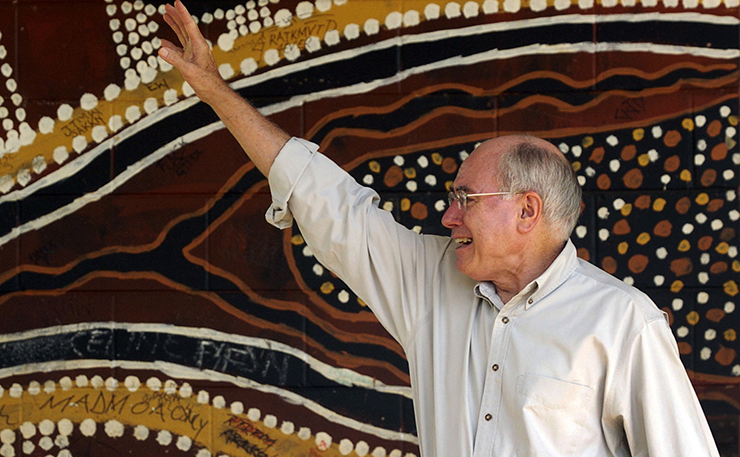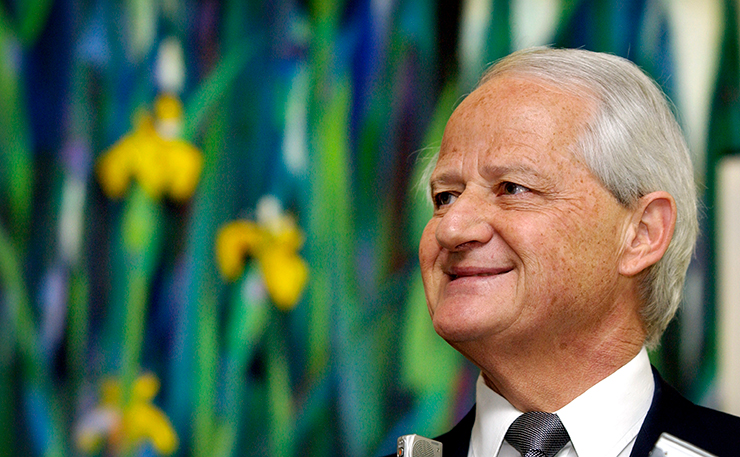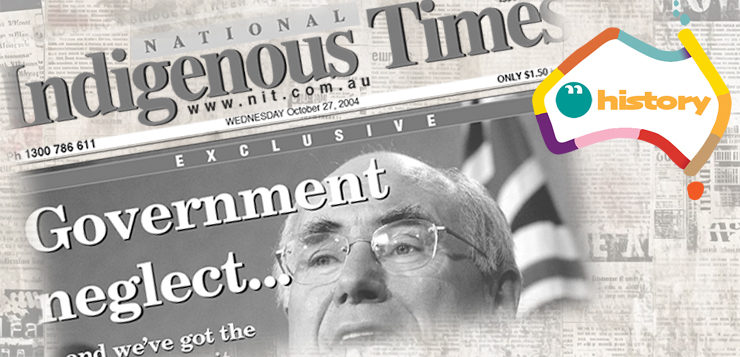 In October 2004, the National Indigenous Times (NIT) newspaper revealed the Howard government’s shambolic attempts to conduct a simple review into its own service delivery to Indigenous communities. The story came from the leak of a large cache of federal ‘cabinet-in-confidence’ documents to NIT editor Chris Graham and journalist Brian Johnstone, followed by the now infamous Australian Federal Police raid on Graham’s home and office, the visual surveillance of NIT staff, and the tapping of its phones. An updated version of the story is being published by New Matilda in the lead-up to the Voice referendum on October 14 to help readers form a better historical understanding of the frustrations Indigenous people suffer at the failure of successive Australian governments to deliver basic services to some of the nation’s most vulnerable citizens.
In October 2004, the National Indigenous Times (NIT) newspaper revealed the Howard government’s shambolic attempts to conduct a simple review into its own service delivery to Indigenous communities. The story came from the leak of a large cache of federal ‘cabinet-in-confidence’ documents to NIT editor Chris Graham and journalist Brian Johnstone, followed by the now infamous Australian Federal Police raid on Graham’s home and office, the visual surveillance of NIT staff, and the tapping of its phones. An updated version of the story is being published by New Matilda in the lead-up to the Voice referendum on October 14 to help readers form a better historical understanding of the frustrations Indigenous people suffer at the failure of successive Australian governments to deliver basic services to some of the nation’s most vulnerable citizens.
OCTOBER 27, 2004: Virtually every member of the Howard government ministry failed to properly undertake a major review into their own departments to find ways to better deliver programs and services to Indigenous communities, a leaked federal cabinet document reveal.
Instead, the federal ministers “almost without exception” delivered a series of findings into how their government departments managed Indigenous staff. And they took almost two years to stuff it up.
The extraordinary admissions are contained in a letter marked ‘Cabinet-in-Confidence’ from former Indigenous Affairs Minister, Philip Ruddock to the Prime Minister, dated April 17, 2003. A copy of the letter was leaked to the National Indigenous Times newspaper.
But the “generally poor” quality of the portfolio reviews wasn’t the government’s biggest failing. The document reveals that Mr Howard’s ministers took so long to complete the reviews into their own programs that by the time the findings were delivered, public policy had already “changed substantially”.
The letter notes that given the delays in delivering the reviews, and the subsequent shifts in public policy, there was “only limited value in going back to Ministers to highlight the inadequacies of their portfolio reviews”.
The Prime Minister first directed his ministry to review the service delivery of federal programs to Aboriginal communities on December 19, 2000. Five months later, Mr Ruddock publicly outlined the portfolio reviews as part of the government’s budget announcements for the 2001/2002 financial year.

“As part of the Commonwealth’s response to the COAG decision on reconciliation, the Prime Minister has asked all portfolio ministers to review their mainstream and Indigenous specific programmes and services to improve outcomes for Indigenous Australians,” Mr Ruddock said.
“These reviews will consider the extent to which program guidelines allow for flexible responses in partnership with local communities and the extent to which programs are integrated with the range of other federal, state and local government programs at the local community level.
“These reviews will be completed this year and a comprehensive whole of Government response will be provided.”
But by the end of 2001, the reviews were still not finished.
Mr Howard wrote to Mr Ruddock on December 21, 2001 asking him to “ensure that the momentum of the portfolio reviews process was not lost”.
On April 7, 2003 – almost two-and-a-half years after the reviews had been ordered – Mr Ruddock finally wrote back to the Prime Minister.
“I am pleased to inform you that the portfolio reviews have been completed, with the exception of the Education, Science and Training portfolio,” Mr Ruddock wrote.
“They have been considered by a working group comprised of officers from your department, ATSIC, and the Office of Aboriginal and Torres Strait Islander Affairs (OATSIA).
“The working group found that the quality of the portfolio reviews was generally poor.
“You (the Prime Minister) asked that they consider the extent to which program guidelines allowed for flexible local community level responses, and the extent to which their programs were integrated with the range of other federal, state and local government programs at the local community level.
“Almost without exception the portfolio reviews did not [do this].
“They tended to focus on internal human resource management.”

Mr Ruddock also commented on the usefulness of the reviews given the delays in completing them and outlined an alternative way forward.
“Quite some time has passed since the reviews were commissioned and the policy climate has changed substantially. I believe there would be only limited value in going back to Ministers to highlight the inadequacies of their portfolio reviews.
“Instead, I believe there are opportunities to further the momentum established by the COAG Reconciliation Framework and portfolio view processes.
“I would like to bring forward to Cabinet a zero-cost package focussed on ensuring all Commonwealth departments and agencies are adopting best practice when it comes to addressing Indigenous disadvantage.”
Mr Ruddock said despite the failure of the portfolio reviews, government agencies in 2003 were “more willing and better equipped to constructively engage and overcome the barriers that have prevented Indigenous people from accessing and fully benefiting from the Government’s programs and services”.
He noted that departments such as Health And Ageing and Family and Community Services had already initiated “major new internal business processes around the theme of making Indigenous business everybody’s business”.
“The Commonwealth Grants Commission (CGC) Report on Indigenous funding and the Government’s response to it have been influential in giving momentum to this change.
“Enhancements to the original COAG reconciliation agenda in April and December 2002 have also added strength to the overall strategic framework.”
A spokesman for the Prime Minister said the National Indigenous Times was seeking to misrepresent Mr Ruddock’s letter.
Ruddock To Howard Letter Cabinet
“The selective conclusions drawn misrepresent the content and purposes of the minister’s letter,” the spokesperson said.
“Since then the ATSIC Review and subsequent changes to ATSIC have reinforced the government’s determination to ensure better service delivery and improvement at a local level in accordance with the strong wishes of local communities.
“The government is further determined to see local communities involved in decisions regarding the delivery and coordination of services.
“Further the government is determined to work with communities to meet the challenges caused by welfare dependency.”
Mr Ruddock declined to comment.
Incoming Opposition spokesman on Indigenous Affairs, Senator Kim Carr, told NIT the Howard government had never justified its recent decision to mainstream Indigenous programs.
“Its mainstreaming of programs is an experiment that may cost Aboriginal and Torres Strait Islander people dearly,” Senator Carr said.
“This damaging leaked document reveals John Howard’s review process to be a sham.
“Senior Government ministers have done a shoddy job of the review, failing to address the local responsiveness and flexibility of programs or the extent to which they were coordinated with Commonwealth agencies, and State and Territory governments.
“This ‘poor’ effort from the Howard Government should ring alarm bells on a number of levels.
“[It’s] leaving all Indigenous programs in the hands of politicians and bureaucrats who are now known to have been indifferent to the internal review of their own performance.”
* The original version of this story entitled ‘Government Neglect… And We’ve Got The Letter To Prove It’ appeared in the National Indigenous Times on October 27, 2004.
Donate To New Matilda
New Matilda is a small, independent media outlet. We survive through reader contributions, and never losing a lawsuit. If you got something from this article, giving something back helps us to continue speaking truth to power. Every little bit counts.




